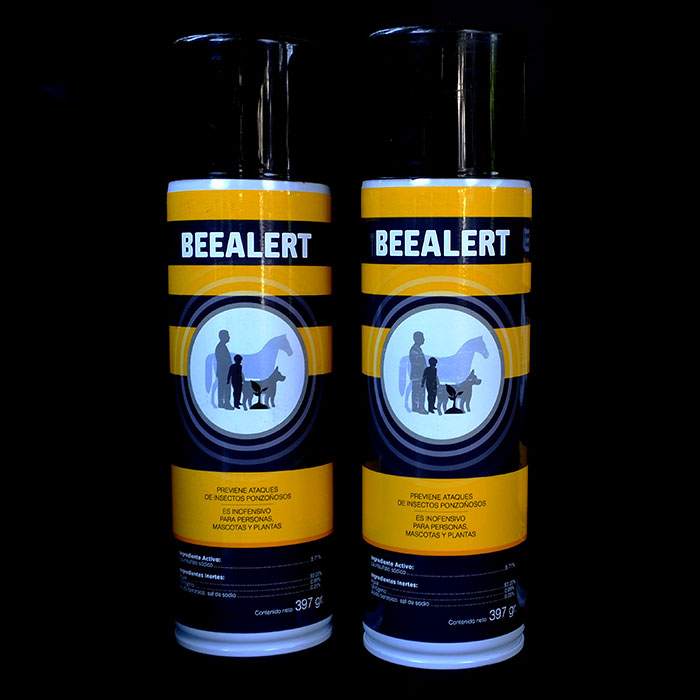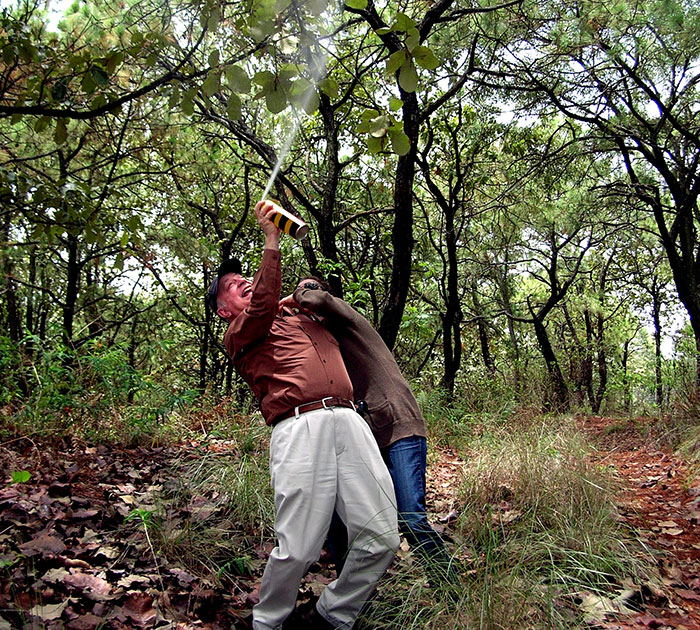| |
|
How to quell a
killer-bee attack
BeeAlert arrives in Mexico |
By John Pint Mention the words “ataque de abejas” (bee attack) to anyone living in rural Mexico and for the next half hour you will surely hear story after story about relatives and friends whose brush with bees ended either miraculously well or tragically bad… “We went on horseback to an old mill on our rancho,” María Cristina Barragán told me, “and bees swarmed out of a hole in the wall. They covered the faces of my teenage daughter and her friend and all four of us were stung again and again until we jumped into a canal full of water to escape them. That’s when they went straight for our horses. In the end, the four of us lived, but three of our horses and one of our dogs died.” For basic information on what to do in case you find yourself in a similar situation, see Recommendations for Avoiding or Surviving a Mexican Killer-Bee Attack.  After
battling bureaucracy for four years, Melder Industries has succeeded in
bringing BeeAlert to Mexico. The product, which has a patented spray
mechanism, is non-toxic and environmentally friendly.
The so-called killer-bee problem began in 1957 when 26 Tanzanian swarms escaped quarantine in Brazil. They began breeding with local bees, resulting in the Africanization of bees throughout most of the Americas. The new hybrid turned out to be a very sensitive and aggressive creature, quite ready to chase “invaders” of their territory for kilometers. In the late 1980s most of Mexico's bees were Africanized and today the hybrid is slowly conquering the USA. According to the New York Times, the first US citizen to die of an Africanized bee attack was Lino Lopez, an 82-year-old rancher who was stung to death in Harlingen, Texas in 1993. When I sat down with members of a special committee which was set up in 1991 to control Africanized bees in Metro Guadalajara, I was amazed to learn that they receive between 200 and 300 bee-attack emergency calls every month, all year round. “And that is just inside the boundaries of Greater Guadalajara,” they told me. The reason I was meeting with this committee was because I too have experienced perhaps more than my share of Africanized bee attacks while beating through the bush looking for caves. On one occasion a good friend received over 60 bee stings while running for her life and ended up in the hospital—but still alive. This is why, some years ago, I took special interest in reports about a non-toxic spray called BeeAlert that could halt a bee or wasp attack and allow victims to slip away. I asked the inventor of BeeAlert, Will Baird of Houston Texas to tell me his bee-attack story. “It wasn’t I who was attacked,” he told me, “it was my neighbor, and he died as a result. He was on a tractor pulling a huge grass mower and the noise upset the bees in his own hive, which he didn’t realize had become Africanized. They poured out of the hive and began stinging him viciously on his head and arms. As a result, he fell off the tractor and the mower blades cut off his legs. It was a tragedy, and I set out to find something that could prevent this happening to other people.” The result was BeeAlert, a soap-like spray that creates a fine mist which makes it hard for bees to breathe, forcing them to hold off their attack and giving victims a chance to escape.  When sprayed overhead
with a circular motion, BeeAlert creates a “halo of protection” around
victims of a Bee Attack.
In January of 2015, Melder Industries of Guadalajara decided to import BeeAlert, especially for the benefit of their customers living on ranches where bee attacks are common. Scrupulously following Mexico’s complex importation regulations, it took Melder nearly four years to obtain permission to bring this non-toxic, shampoo-like spray across the border. Today, BeeAlert can be found at Supervet, a chain selling pet food and accessories in Jalisco, with an on-line store delivering all over Mexico. For more information, call 018007137037 weekdays from 8 am to 5 pm. The closest Supervet store to the Lake Chapala area is Sucursal Supervet Aeropuerto located on the highway to Guadalajara’s international airport, tel (33) 3735 5707. Information on BeeAlert in English can be found at beealert.com. If you know someone who loves visiting places off the beaten path, you may want to surprise them with a 14-ounce can of BeeAlert. It may seem like an unusual gift, but it just might save a life. |
